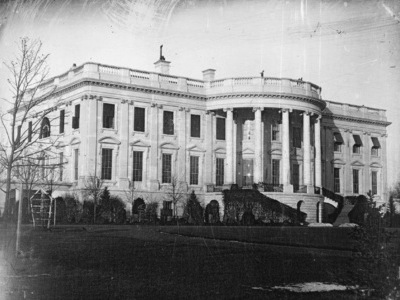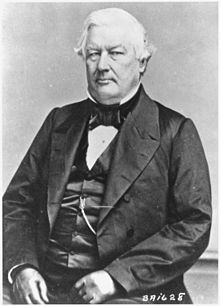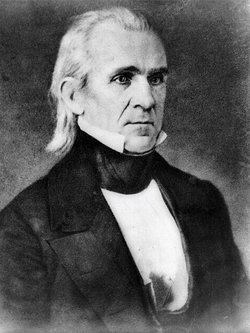The 5 Most Overrated Presidents of American History
Dan Bryan, February 25 2013

Historians are often asked to rate the Presidents that have served in the United States, and these have in turn been made into a number of lists by different publications.
Certain Presidents are consistently overlooked, while others are in turn overrated. Below I have compiled a personal list of the 5 most overrated Presidents of American history (a rankings archive can be found here).
5. Millard Fillmore

Millard Fillmore did as much as any President to lay the groundwork for the Civil War. It was Fillmore who drove and presided over the Compromise of 1850 which included the Fugitive Slave Law. Fillmore's support for that provision essentially led to the collapse of the Whig Party. Once that party was weakened in 1852, the Democrats had free rein to pass the Kansas-Nebraska Act. While much of the blame for the Civil War has (with justice) been laid on Franklin Pierce and James Buchanan, Fillmore was equally culpable.
Fillmore's failures did not end with his Presidential term. Whether through bigotry or naivete he became the most prominent leader of the Know-Nothing Party, accepting their Presidential nomination in the 1856 election. The Know-Nothings, of course, were a hybrid of a legitimate political party and a quasi-secret society, complete with levels of membership and clandestine meetings. They spent much of the 1850s denouncing the presence of Irish and German immigrants in the United States and inciting passions against them.
While few historians rate Fillmore with esteem, he is really one of the three or four worst Presidents in American history, and usually not placed quite that low in the overall assessments.
4. John Quincy Adams
Late in his life, as a Congressman from Massachusetts, John Quincy Adams became a passionate and eloquent opponent of slavery. He deserves much honor for this stance.
As a President, Adams was anti-democratic, nepotistic, and consistently supported the interests of well-connected businessmen and bankers over the common man in America. Even his election was a corrupt fiasco (called "The Corrupt Bargain" by his opponents). Adams won 30.9% of the popular vote, failed to carry any state south or west of New York, and only assumed office at the behest of an anti-Jackson Congressional coalition.
Adams was part of the nascent political base that supported the interests of East Coast bankers and industrialists over any other constituency, in what was misleadingly termed the "American System". Tariffs were increased to support New England factories and industry. Internal improvements were funded (though not nearly as much as Adams would have liked) via subsidies to certain road and canal companies -- almost always those which were well-connected to the political elite. In fact, such programs were opposed by Democrats during this entire era because they were rightfully seen as a corporate boondoggle -- they would almost be the equivalent of the federal government subsidizing Exxon-Mobil to maintain the Interstate Highway System in modern times.
In part to hold wages down, Quincy Adams nearly halted the sale of Western lands (increased tariffs made up for the revenue) to prevent the expansion of opportunity there. He also supported Second Bank of the United States policies which overwhelmingly favored the Eastern financial centers and suppressed Western development and banking.
Finally, Adams was last in a line of early Presidents who strove to preserve the United States explicitly as an aristocratic republic. For many years after the founding of the United States, voting was restricted to the wealthy. In large part, the struggle between Adams and Andrew Jackson was over the continuance of this arrangement. For good reason, Adams and his political allies knew that their programs would be defeated if working-class white men were allowed to vote in full. With Adams's defeat in 1828, the ascent of Jacksonian Democracy was confirmed, becoming the first of many waves in the expansion of American suffrage.1
1 - Note that the vote a state-by-state issue, and Adams did not have a direct hand in voting law. However, he was firmly in support of extremely limited suffrage.
3. Woodrow Wilson

An important blueprint for Bush-era repression and McCarthyism was Woodrow Wilson's infamous propaganda campaign of 1917, upon America's arguably dubious entry into World War I. The key mechanism of Wilson's agenda was the Committee of Public Information, led by George Creel. Thousands of speeches and films were presented to convince Americans of the necessity for war, while outspoken opponents were arrested.
Even Wilson's supporters are forced to acknowledge that he was the most anti-black President since the days of Andrew Johnson. His admiration of the Klan is sufficient evidence of this, but in practical terms he also resegregated the federal government and reduced black employment there. Additionally for Wilson, any white Americans who had non-British ancestry were suspect. He did nothing to stop the rabid anti-German prejudice that broke out with World War I, and lied to America's Irish community (claiming he would later support Irish independence from Britain) to win their tepid support for the war.
Although the women's suffrage Amendment was passed at the end of Wilson's presidency, he deserves little credit. Women's suffrage was primarily a Republican issue, and Wilson opposed it almost to the end. He likely only "evolved" on this issue when it was clear that an Amendment would eventually pass.
Those of a small-government inclination should note that Wilson was instrumental in the creation of the Federal Reserve and the federal income tax. While Wilson did have redeeming qualities and was a good soldier for America's Progressive movement, it seems absurd that he would be considered a top 10 President by any modern observer.
2. James K. Polk

It is bizarre that many of the same historians who rate Millard Fillmore, Franklin Pierce, and James Buchanan as our worst Presidents, at the same time elevate James K. Polk to such a high standing. He consistently ranks as one of our 10 or 12 best Presidents in historian surveys.
This distinction is simply illogical. On the key issues of the day, be it slavery or otherwise, there was almost no difference in the philosophy of James K. Polk and the philosophy of Pierce or Buchanan, other than the fact that Polk was an actual slaveowner. None of them had a problem with the expansion of slavery to the West. None of them had any respect for the abolitionist movement. In fact, James Buchanan served as Polk's Secretary of State, which in that era was the single most prestigious Cabinet position (although Buchanan was a bit hamstrung there). This would not have happened unless Polk and Buchanan shared extremely similar views and inclinations.
With the Mexican-American War, Polk made the United States a coast-to-coast nation (and laid the groundwork for the bitter fights of the 1850s over slavery). This is by far the biggest piece of his legacy. One can argue that the conquest of 1/3rd of Mexico was extremely important for the long-term development of the United States from a realpolitik perspective, but the squeamishness with that war is not simply modern revisionism. Both Abraham Lincoln and Ulysses S. Grant, for instance, were opponents at the time (though Grant performed admirably in his role with the military). It is ultimately a great philosophical question that has no answer here -- does the present strength and prosperity of the United States justify the manner in which James K. Polk expanded the country in the 1840s?
Leaving that aside, however, if one is to elevate Polk to a list of the top 10 Presidents, they must build a more convincing argument to distinguish him from our "worst" Presidents who followed him -- Buchanan, Pierce, and Fillmore.
1. Andrew Johnson

How can a President who consistently ranks in the bottom 5 of historical surveys be overrated? Simply because he doesn't rank at the bottom. Warren Harding is often given that dubious honor, but he was simply a buffoonish, philandering incompetent at heart. Harding did little lasting harm to the United States. On the other hand, Andrew Johnson's legacy haunted the country for at least a century after his death.
Johnson failed in every way in his responsibility of reuniting the country after 1865. He was complicit in the attempts of most Southerners to quickly transition from slavery to a quasi-feudal, racist agrarian system. He turned a blind eye to the Black Codes and sabotaged efforts at education and land distribution for the freed slaves. A good compromise would have involved real enforcement of the 13th - 15th Amendments as well as strong oversight on the Federal troops and Reconstruction governments that controlled the Southern states in the war's aftermath.
Instead, in the wake of Johnson's ignominious political performance, the Republicans gained such overwhelming Congressional majorities that they operated with essentially no check to their power. Thousands of veterans, speculators and adventurers poured into the South, donned the label of Republicans, and assumed positions of power with varying degrees of corruption. In Alabama, for instance, half a million dollars in unauthorized railroad bond "investments" to political allies nearly bankrupted the state treasury. When resistance emerged, most Republicans quickly fled with whatever resources they could take with them.2 The fate of the freedmen was of secondary importance.
A responsible national leader (Abraham Lincoln perhaps) should have been able to prevent these fiascos while ensuring the rights of freed slaves were protected. Instead, through his incompetence, Johnson actually exacerbated the leadership vacuum and helped perpetuate one of the darkest episodes in American history.
2 - The most criminal failure of the Republicans was their management of the Freedman's Savings and Trust Company. This was a federal savings bank that served the freed slaves, and for nine years it collected their deposits and "invested" them with corrupt business associates. Once it was clear that the swindle was unraveling, the Bank's managers duped Frederick Douglass into assuming command so that he could be blamed for the ultimate failure. Many thousands of freed slaves lost every penny that they had deposited.
